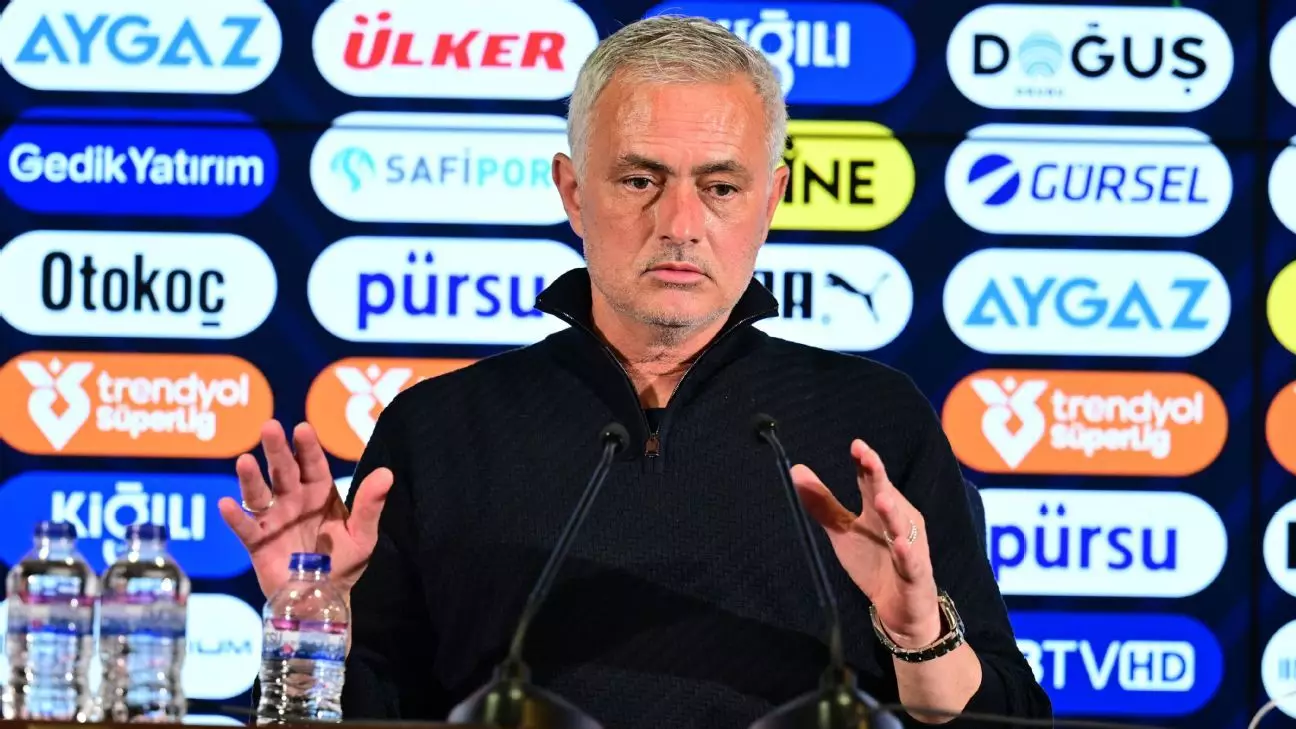Fenerbahce’s recent performance has left fans with a bitter taste as the team continues to grapple with an uphill battle in the Turkish Super Lig. The 1-0 loss at home to fierce rivals Besiktas was not just another defeat; it was a significant blow that pushed Fenerbahce eight points behind league leaders Galatasaray, with only four matches left in the season. Entering the season with high expectations, Fenerbahce and its followers aspired for a championship title after a decade-long drought. This recent result, however, raises pressing questions about the future direction of the club and its coach, José Mourinho.
Mourinho’s Dilemma: Future Uncertain
After the demoralizing loss, Mourinho was evasive when discussing his plans for the following season, stating firmly that “these are things to speak internally and not with the media.” His reticence is telling; it implies a rift between expectation and reality. Given his two-year contract initiated last summer with explicit goals tied to restoring Fenerbahce’s former glory, the heat is on. The not-so-subtle undertones of his frustrations reflect not just a coach under pressure, but a man wrestling with the complexities of leading a football club amidst daunting challenges.
It’s crucial to recognize that Mourinho’s comments hint at the increasingly toxic atmosphere permeating Turkish football. The Portuguese manager has been vocal about an underlying “system” that constrains fair competition within the league. His critique suggests that Fenerbahce is fighting against more than just rival teams. It poses an intriguing question regarding systemic biases and the influence they wield over match outcomes. Mourinho’s candid acknowledgment of this “system” and its overwhelming hold on the game reflects the disillusionment harbored by many involved in Turkish football.
The Importance of Mental Resilience
Mourinho’s remarks regarding the mental toll such systemic pressure places on players cannot be understated. He pointed out that the struggle of Fenerbahce is both functional and psychological. The notion that external factors can undermine internal aspirations is a concept that resonates deeply in the realm of sports psychology. Players must not only overcome their competitors; they must also cultivate an unwavering belief in their capacities against forces they cannot control. Mourinho appears to understand this dynamic well, and it reflects in his coaching philosophy, promoting mental fortitude alongside tactical awareness.
The challenge now lies in how Fenerbahce can adapt to these realities. Acknowledging vulnerability—be it in strategy or mentality—can be a step toward resilience. With the league title slipping further from their grasp, the squad needs to rally together. Mourinho’s experience could either be an asset in navigating these choppy waters or a double-edged sword, depending on how he manages to engage his players and the emotional landscape of the team.
The Weight of Expectations and Fan Reaction
Despite his credentials and past successes, Mourinho is not immune to scrutiny. The dissatisfaction from fans following yet another derby defeat—coupled with the inability to secure wins against primary rivals—illustrates the immense pressure he faces. The expectation to deliver results in a culture marked by passionate rivalries is magnified. Mourinho acknowledged that it’s “normal in this culture” for fans to react when their expectations aren’t met. His acceptance of this reality is both humble and strategic; it suggests an awareness that engagement with the fanbase is paramount, even in times of struggle.
Yet, the question remains: can Mourinho transform criticism into constructive momentum? He must harness the collective disappointment as motivation, channeling it into a focused resurgence to reclaim not just points on the board but also the trust and belief of those who stand behind the team.
A Shared Journey with Ole Gunnar Solskjær
In a recent press interaction, Mourinho was also asked about Ole Gunnar Solskjær, his counterpart at Besiktas, acknowledging their mutual respect and sidestepping any detailed advice. This interaction signifies a camaraderie shared among managers, even when fortunes on the field differ drastically. Both coaches face similar challenges of managing expectations and navigating the tumultuous football landscape in Turkey. In a sense, the relationship between the coaches could reveal how shared experiences in the competitive arena can either forge supportive bonds or intensify rivalries.
As Fenerbahce marches towards the final stretch of the season, the atmosphere surrounding the club remains charged. The question of who will lead this storied institution into the next chapter is both pressing and pivotal. Not only does Mourinho need to find a way to adapt to the pressures of the league, but he must also instill a sense of resilience that can steer Fenerbahce back toward their aspirations—a challenging but not impossible task.


Leave a Reply